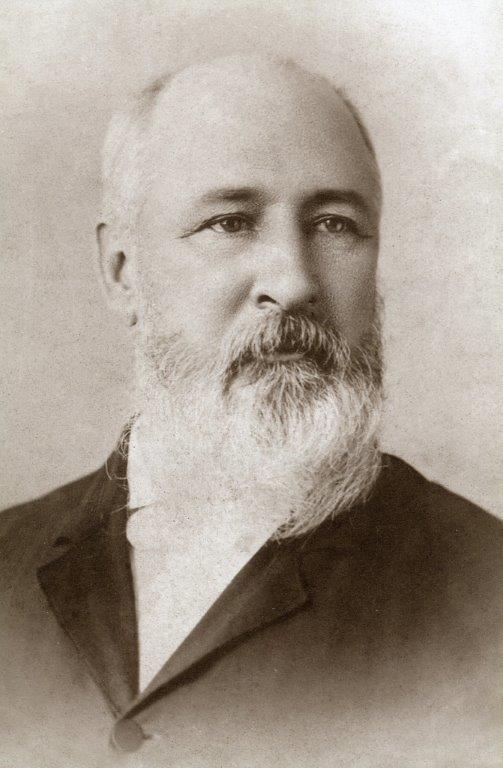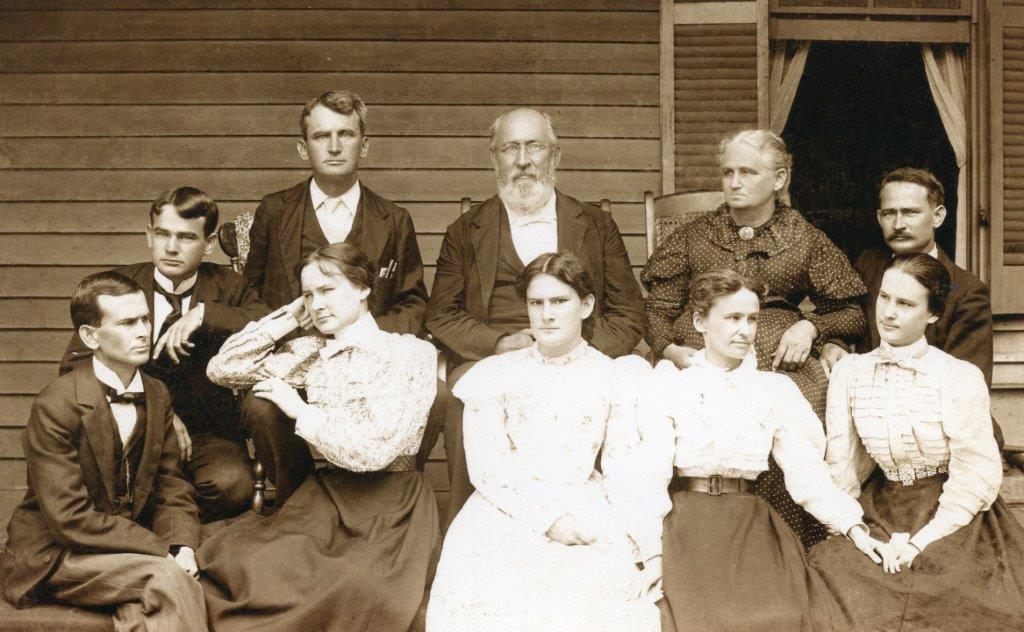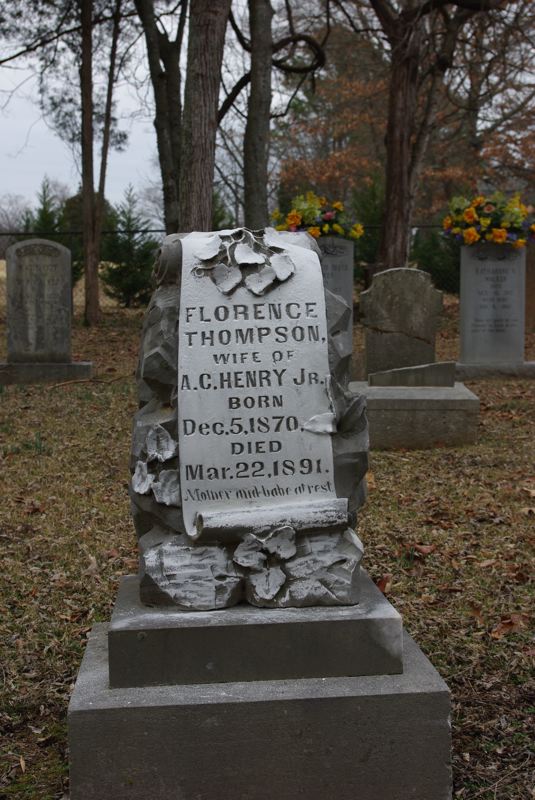Dr. Ausbun Cicero Henry
*1836-1903
![]()
Dr. A.C. Henry, Watson
A Memorable Meeting At Belgreen, Kimbrough
Dr. A.C. Henry, Obituary, Alabama Courier
Dr. Ausbun Cicero Henry - Birmingham Ledger
Amanda Payne Henry, Kimbrough
Amanda Payne, Alabama Courier
Minnie Henry, Alabama Courier
A.C. Henry, Jr. - Ga Obituary
Mandus Henry - Obituary, Alabama Courier
Florence Belle Thompson Henry
Wedding Invitation - A.C.Henry, Jr. & Florence Thompson
Dr. A. C. Henry, Beloved Physician
Grave of Florence Belle Thompson Henry
Grave of A.C. Henry, Jr.
Directions To The Grave Of Dr. A.C. Henry
Henry Grave Photos
Special Thanks
Dr. A.C. Henry
 In 1858 Ausbun Cicero Henry, of Wilcox County, graduated in medicine and selected Butler County as his field, making his home with the family of Thomas J. Payne. Nursing the Payne daughter Amanda, just out of the J.M. Barnes School at Strata, through a long spell of typhoid fever, he won her as his wife.
In 1858 Ausbun Cicero Henry, of Wilcox County, graduated in medicine and selected Butler County as his field, making his home with the family of Thomas J. Payne. Nursing the Payne daughter Amanda, just out of the J.M. Barnes School at Strata, through a long spell of typhoid fever, he won her as his wife.
In 1865, after he returned from the war where he had served as a Confederate surgeon, he found his hopes and fortunes shattered. Through his wife's influence, he began to study the scriptures and to hear preaching as opportunity afforded. In the winter of 1865, they were visited by her former teacher, J. M. Barnes, who taught them the way of the Lord. From his baptism in 1866 until he was buried thirty-seven years later, Mr. Henry was active as a minister, baptizing as nearly as he could calculate, about six thousand souls.
To do this, he made unknown sacrifices. When he was offered a professorship and city practice after the war, his wife said, "No, preach the gospel and we will live somehow." What medical practice he did was to add to his meager income to care for his family. His labors took him over Alabama and several Southern states. He made one extended trip into Ohio, Virginia, and Pennsylvania, raising funds to build the brick church in Huntsville. He was thoroughly missionary, uncompromisingly scriptural and strongly in favor of the united action of the brotherhood in the evangelization of Alabama and the world.
The Henrys moved from Athens to Birmingham in 1899, in which year Mrs. Henry died. He died in that city in 1905.*
- History of the Christian Churches In The Alabama Area, by George H. and Mildred B. Watson, page 259
A Memorable Meeting At Belgreen
During the last two decades of the nineteenth century, Dr. A.C. Henry held gospel meetings and filled monthly appointments in Northwest Alabama. In 1883, after he brandished Zion’s sword at Mt. Hope in Lawrence County and put to flight an aggressive “Campbellite killer” of John Wesley’s brand, he followed the sun westward about twenty miles to preach in a gospel meeting, Monday through Friday, at Belgreen, which was then the county seat of Franklin County. This proved to be a memorable occasion. After the services of Wednesday, Dr. Henry performed the wedding ceremony of John T. Underwood and Ira Emma Grissom. In reporting the meeting, he wrote: “Bro. Underwood, student of T.B. Larimore at Mars’ Hill College, is a young preacher of much promise.” Underwood indeed became one of the ablest proclaimers of the gospel in Northwest Alabama during the remaining years of his life. Among those who attended this meeting was John Taylor who lived on Lost Creek a few miles west of Belgreen. This old warrior of Northwest Alabama was then nearing the end of his long ministry, even as John T. Underwood was beginning his.
Dr. Henry wrote: “We also met the venerable John Taylor, a pioneer of the cause, worthy of double honor ‘for his works’ sake.’ He told me that he had baptized with his own hands over forty-five hundred. He is quite old and feeble (about seventy-six), but oh how he loves the cause of the Master.”
In that same meeting at Belgreen, Dr. Henry said he also met Lee Jackson, another of Larimore’s “boys” who was then preaching in Franklin Country and later did great work in Mississippi. Among others who attended that meeting were the parents and sisters, with their husbands, of F.D. and F.B. Srygley. This was a short time before most of the Srygley clan in and around Rock Creek migrated en masse to Coal Hill, Arkansas, to which F.B. Srygley made annual trips for the next fifty years. Regarding F.D. and F.B. Srygley, Dr. Henry wrote: “It is no wonder they are preachers and love the work, with such a mother as they have.” (Gospel Advocate, Nov. 21, 1883.) Imagine a meeting in a small country village with ties to so many monuments in Restoration history. What a meeting that must have been.
-Earl Kimbrough, Alabama Restoration Journal, 2009, Vol. 4 #1, page 17
Dr. A.C. Henry
Obituary, Alabama Courier
Dr. A.C. Henry, one of the best known ministers in the Christian church in this section of the south, was found dead in his bed at Woodlawn, last Thursday morning by members of his family who went to arouse him from his night slumbers. His remains were brought to Athens for burial his wife and a son and a daughter being buried here.
Dr. Henry was a man of splendid and recognized ability and had long been a prominent minister in his denomination. He was for many years a leading physician and did a fine practice at Hartselle, but finally gave up the practice to engage in the more pleasing calling of the ministry. He spent a few years in Athens as pastor of the Christian church and later he was engaged in the evangelical work. His wife died very suddenly somewhat like her husband while they resided here and later youngest daughter died of consumption.
Many friends in this place were grieved to hear of his death.
-Obituary – The Alabama Courier Wednesday - September 30, 1903, Contributed by David A. Cox
Dr. Ausbun Cicero Henry
Obituary-Birmingham Ledger
Yesterday the body of Dr. A. C. Henry was found dead in his bed. Dr. Henry, who resided at 5508 3rd Avenue, was a well known minister of the gospel. He was formerly a physician, but of late had given up medicine for theology. He was over 60 years of age, the cause of death being presumably heart failure.
Dr. Henry was considered an able evangelist. He had labored in the evangelical field both in Alabama and Texas. Three sons and three daughters survive him. His wife died about four years ago and another daughter last spring.
The minister had been in bad health for a long time, but had appeared on the streets in the night before and was not thought to be in any worse condition than heretofore.
Funeral services were conducted from the residence at 9:30 o’clock this morning, after which the remains were shipped to Athens.
-Obituary – Birmingham Ledger Sat. - September 26, 1903 - Contributed by David A. Cox
Amanda Payne Henry
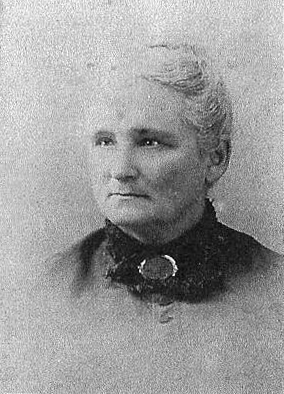 Typhoid fever is described as an acute infectious disease caused by Salmonella typhi. It is a greatly debilitating affliction that usually lasts two to four weeks with treatment, but it can also result in death. One medical dictionary lists nineteen symptoms ranging from severe headaches to disruptions of bodily functions and hallucinations. The disease was common in pioneer times and was much more dangerous then. This disease had a particular effect on the life of Dr. Ausbun Cicero Henry, a medical doctor who became one of the most successful gospel preachers of nineteenth century Alabama. Dr. Henry finished medical school in 1858, at the age of twenty-two, and chose Butler County, Alabama, southwest of Montgomery, as his field of service. This was near Wilcox County where he was born. He made his home with the family of Thomas J. Payne, a prosperous planter living nine miles northeast of Greenville.
Typhoid fever is described as an acute infectious disease caused by Salmonella typhi. It is a greatly debilitating affliction that usually lasts two to four weeks with treatment, but it can also result in death. One medical dictionary lists nineteen symptoms ranging from severe headaches to disruptions of bodily functions and hallucinations. The disease was common in pioneer times and was much more dangerous then. This disease had a particular effect on the life of Dr. Ausbun Cicero Henry, a medical doctor who became one of the most successful gospel preachers of nineteenth century Alabama. Dr. Henry finished medical school in 1858, at the age of twenty-two, and chose Butler County, Alabama, southwest of Montgomery, as his field of service. This was near Wilcox County where he was born. He made his home with the family of Thomas J. Payne, a prosperous planter living nine miles northeast of Greenville.
The Payne’s oldest daughter, Amanda, a beautiful teenage girl just out of Justus M. Barnes’ school at Strata Alabama developed typhoid fever after her return from school. She was, quite naturally, attended by the young physician living in her parents’ home. Dr. Henry nursed the young girl through a long spell of typhoid fever. But he was amply repaid for his skill and tender care in guiding Amanda through her severe illness by their falling in love. He had been twenty-four but one month, and she was seventeen on the day of their marriage, October 17, 1860. She became a gentle companion to her young husband and through the future years of their lives together. Her son, J. Waller Henry, described her as “one of the best wives and most self-sacrificing Christian mothers this world has ever known.” (Alabama Christian, July 1906.)
The Civil War began the year after their marriage and Henry entered the Confederate army as a surgeon. The year the war ended, 1865, found him with his worldly hopes shattered and his fortunes blasted. Through his wife’s gentle influence, he began to study the Scriptures and to hear the pioneer gospel preachers of South Alabama as often as opportunity afforded. They were now living in Wilcox County where, in 1865 and 1866, they were visited by her former teacher, J. M. Barnes, who taught them the way of the Lord more perfectly. “At the next appointment of Dr. [David] Adams in that section of Wilcox … she was buried in baptism with her Savior, he following some months later in the summer of 1866.” (Ibid.) David Adams was a medical doctor at Pine Apple, Alabama, who also preached the gospel throughout that region of South Alabama. He became a lifelong friend of Dr. Henry and they often worked together in the Lord’s vineyard.
Not long after his baptism, Dr. Henry began preaching. At the time, a medical college that was reorganizing after the war, knowing his high standing at graduation, offered him a professorship and a profitable city practice that accompanied it. But his wife said: “No, preach the gospel, we will live somehow!” He followed her counsel and gave up the practice of medicine to preach the gospel. But he occasionally returned to the practice of medicine to support his family. His son writes: “Other opportunities were neglected by him because they would so occupy his time that he could not preach. Even what practice he did was merely as an aid to his life work, to splice out his meager income so that his rapidly growing family could continue to live while he continued to preach the gospel.” (Ibid.).
Dr. Henry’s evangelism extended over much of Alabama, centering in South Alabama in the early years, but in North Alabama during the last two decades of his life, except for a two-year ministry in Texas, which proved to be highly unsatisfactory to him. It was not only the nature of his evangelism in the Lone Star State that troubled him, but in 1891, he wrote: “Since Oct. 22, 1890, I lost four grandchildren (all small), a son-in-law, a daughter-in-law, and now my last sister.” (Gospel Advocate, Dec. 10, 1891.) The deceased sister was the last of his twelve brothers and sisters, leaving him alone of that large family. Dr. Henry kept no record of the baptisms he performed in the time of his service, but as nearly as he could calculate, the number would reach six thousand souls. His son said: “To this work he made sacrifices of which the outside world knew little and never can know all.”
Sarah Kirkpatrick Payne, the wife of Thomas J. Payne and the mother of Amanda Payne Henry, was the sister of Col. M. C. Kirkpatrick, one of the pioneer gospel preachers of South Alabama. Kirkpatrick and Samuel Jordan were long associated with J. M. Barnes in connection with his schools at Strata and Highland Home, south of Montgomery. They were also Barnes’ brothers-in-law, having married Barnes only sisters. Sarah Kirkpatrick was converted under the preaching of Alexander Campbell.
After Dr. Henry’s short stay in Texas, he returned to Alabama and settled in Athens, in Limestone County, where he lived until near the end of his life. In 1899, his wife Amanda died. The report carried in the language of a small town paper read: “Athens, Ala., Oct. 27. Mrs. A. C. Henry, wife of Dr. A. C. Henry, one of the most distinguished ministers of the Christian denomination, died at the home of her husband in this place of heart failure. She had been ill for some time with typhoid fever and was thought to be improved when death came. She was a most excellent woman with many friends, and her loss will prove a great one to her church to which she was thoroughly devoted.” (Franklin Times, Nov. 3, 1899.) It is a strange coincidence that Amanda Payne Henry who was being treated for typhoid fever by Dr. Henry when their lives began to blend together and the same disease was afflicting her body when their lives were separated for a time by her death.
-Earl Kimbrough, Alabama Restoration Journal, 2009, Vol. 4 #1, page 16,17
Amanda Henry
Obituary - Alabama Courier
When death comes to claim our loved ones who have been ill long and suffered much, those who are nearest by the ties of blood and affection, are sometimes prepared to bear the loss, but when to comes suddenly without warning, then those who love the victim of the ruthless destroyer most are over whelmed with sorrow and a degree of sadness that is undefinable. Thus it was last Wednesday when the dreaded much shunned messenger entered the quiet and peaceful home of our popular townsman, Dr. A. C. Henry, and robbed him of the partner of his joys and sorrow, who for many years has been his comfort and joy and deprived the loving children of their mother who was all that a mother could be, the blow was hard to bear.
Mrs. Henry had been ill for sometime with slow fever, but no uneasiness was felt for her final recovery, and so much improved was she that her children were all off at their various places of business, and the youngest at school, when without a moments warning the messenger sent from the giver of all gifts, entered the home which only a short while before had been the scene of gladness and happiness and claimed for its own the precious wife and mother. So sudden was the summons that some the children failed to reach her bedside from town before the loving eyes were closed and the beautiful spirit that made her such a compassionate woman had fled.
Mrs. Henry had not long been a resident of Athens, but there was not a woman more beloved by those who knew her than she, and every friend and chance acquaintance in referring to her spoke of her beautiful character and of her deep Christian piety.
She was surrounded by a band of loving children, nourished and comforted by a cultured and loving husband and though fifty-six years had passed since she first entered this life, she was yet a young woman, and only a short time since bid fair to live a very ripe old age for she was a remarkably well preserved woman, with a strong constitution. It is presumed that her death was caused by heart failure, superinduced by the fever.
Her remains were laid to rest in this place last Thursday, and many friends attended the last rites. She leaves behind her faithful husband, four sons and four daughters to mourn the sudden loss of wife and mother.
-Obituary – Alabama Courier November 2, 1899 - Contributed by David A. Cox
Minnie Henry
Obituary – The Alabama Courier
Miss Minnie, youngest daughter of Dr. A. C. Henry, for a number of years a resident of this place and a very popular minister in the Christian Church, died at the home of her father at Woodlawn near Birmingham last Friday and was brought to this place for burial, her mother having been buried here. She was very bright and attractive young girl and was favorite with all who knew her. She was just entering the state of young womanhood when she was seized by that most dreaded of diseases consumption and she soon withered under its blighting touch and her once round and beautiful form was wasted away until she could no longer withstand the ravages of the disease and the spirit gave up the fight and she sank into perpetual slumber.
To those who sorrow for the loss of this fair young flower, we tender a heartfelt sympathy. She was withered on earth to take on a more beautiful bloom in that bright beyond.-Obituary – The Alabama Courier April 29, 1903, Contributed by David A. Cox
A.C. Henry, Jr. - G.A. Obituary
Brother A. C. Henry, Jr., son of Dr. A. C. Henry, of Athens, Ala., was born on February 10, 1868; obeyed the gospel on August 19, 1885; and died on May 2, 1900, at the home of his father. Brother Henry was an invalid for eight years, but being in possession of that love that suffers long and is kind, he bore it all with Christian resignation. To the bereaved ones let me say: Weep not as those that have no hope. God has implanted emotions in the human heart; and instead of being a weakness, they are noble attributes, being one of the great sources of all virtue. From this source springs the sorrow caused by the death of the ones we love. As we stand by the forms of our dead, faithful memory recalls many incidents of the past in those days of peace and happiness which we spent in their society. This should be a source of much comfort to the bereaved ones, that he by a life of devotion was prepared to enter into a more sacred association than earth can afford. The body was laid to rest in the Athens Cemetery.
-Thomas C. King., Cullman, Ala., Gospel Advocate, June 14, 1900, page 378.
Mandus Henry
Obituary, Alabama Courier
It is an old but apparently true saying, that death loves a shining mark, and this was never more aptly illustrated than in the death last week of Mr. Mandus Henry, son of Dr. A. C. Henry, of this place.
Weary months of suffering and wasting away did not seem to disturb the serenity of this excellent and refined Christian character. He seemed to appreciate the fact it was only a matter of days and possibly weeks with him, but this did not disturb his calm composed nature, but rather seemed to make him more agreeable to his family and friends. He was not afraid of the untried beyond the comprehension of man and when the final moment came he met the without flinching and left off his earthly raiment to don that of a more spotless character and instead of his loved ones about home he went to join she who preceded him to that land beyond this vale, a young wife and a beautiful companion. There was a mother, too, waiting over there, who but recently gone before, and she stood, no doubt, with the loving young wife and angelic hands outstretched to receive home their loved one, whose life and character in this earthly vestibule was such that it had well fitted him for the companionship of angels.
We have scarcely known a finer spirit than that of Mandus Henry. Being of our profession, we knew him very well, and in him we found all the attributes of a glorious character. Unostatous, noble and pure minded, faithful in all the watches, he was a man that wore well the name.
His Christianity was such as make the cause respected of all men whether they are of that class or not. He wore it in the open, and his life was an open book, read of all men. Purity was stamped on his face and his character was that mold.
In his work-days he was a devoted follower of newspaperdom and when his hands were not longer able to handle the stick or wield the pen, the profession had lost a most valued member, and it has just cause to regret his death.
In his family, where he daily came in contact with father, sisters, and brothers, was found his grandest type. He was ever uncomplaining and watchful of the feelings and thoughts of those with whom he lived. They were always first above himself with his own hopes and ambitions. But he has gone. Earth is poorer, heaven richer, and the family circle has lost another of its charms, but the circle and chain that binds and draws them nearer to that better land has increased. They will find him, like he found those gone before, waiting for their coming. May they meet him.
-Obituary – The Alabama Courier May 10, 1900, Contributed by David A. Cox
![]()
A.C. Henry's Family
Special Thanks To Charlie Wayne Kilpatrick For This Photo of the A.C. Henry Family
Florence Belle Thompson Henry
Florence Belle Thompson was born at Mars’ Hill, Ala., December 5, 1870. She was one of the brightest and best of the Mars’ Hill pupils. While yet but a little child, she consecrated her life to the service of the Lord. She was faithful and true, from that blessed day to the day of her departure, in the discharge of all the duties implied in her solemn vow of sacred consecration to him who died that we might live. June 10, 1890, she was married to our beloved Bro. A. C. Henry, Jr., at the place of her birth. March 22, 1891, she breathed her “final farewell” to the sorrows of time, at her home in Florence. Twenty-four hours after her sufferings ceased, her body was buried in the Mars’ Hill family burial ground, the beautiful bridal dress worn by the happy child only a few brief months ago being the burial robe worn by the body of the departed saint. My dear, blessed, beloved children: How rapidly “we are passing away!” “Flitting—flitting—flitting, like shadows away!” How brief the time since Florence was the bright, blessed, happy, little baby girl of our sacred school. “A little ray of Sunshine.” Now she is gone. “A few more days—or years, at most”—and we shall all be gone. “Are you ready?” Are we ready? Though you are no longer together at Mars’s Hill, but are scatted throughout the length and breadth of the land, your anxious teacher ceases not to care for you, to pray for you, to love you. Let us all be pure and true and good, and—“some sweet day”—“we shall meet, to part no more.”
-T. B. L., Florence, Ala., Gospel Advocate, April 8, 1891, page 211.

1873 Photo of John and Mary J. Gresham Thompson Family
Note: Baby on Mary's Lap Is Florence Belle, Later The Wife of A.C. Henry, Jr.
Wedding Invitation for A.C. Henry, Jr & Florence Belle Thompson
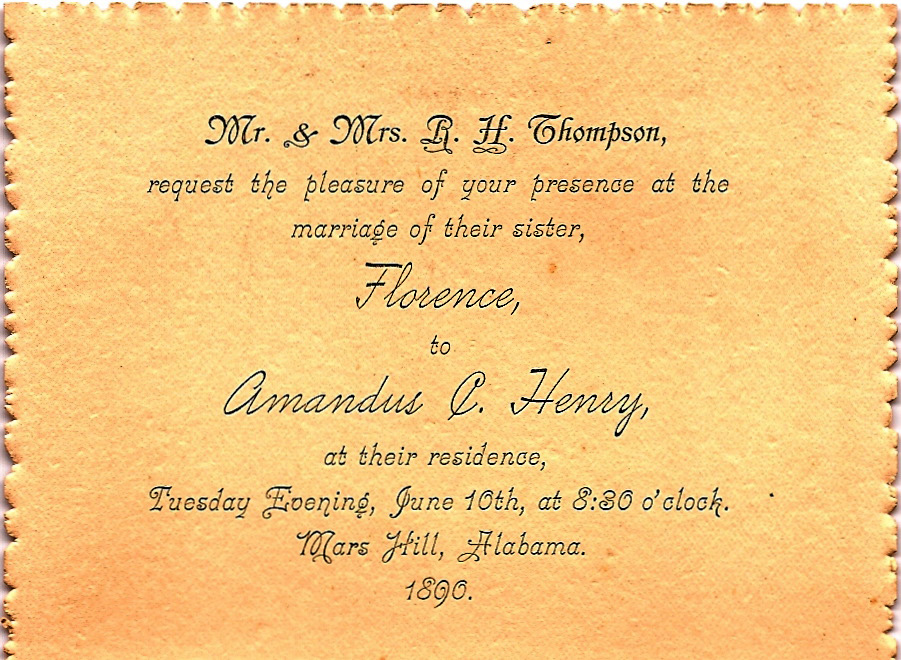
Mr. & Mrs. R.H. Thompson,
request the pleasure of your presenct at the
marriage of their sister,
Florence,
to
Amandus C. Henry,
at their residence,
Tuesday Evening, June 10th, at 8:30 o'clock
Mars Hill, Alabama.
1896
-contributed by C. Wayne Kilpatrick 11.2011
Dr. A. C. Henry, Beloved Physician
Jesus answered and said to them, “Those who are well have no need of a physician, but those who are sick"—Luke 5:31
Perhaps no other man outside of Russell’s Valley ever cast a longer shadow over the Church of Christ in Russellville than Dr. Ausbun Cicero Henry, who preached there during the last two decades of the nineteenth century. Dr. Henry’s preaching in Russellville covered a span of more than twenty years. In 1962 Dr. T. Stratton Jones, Sr. said one of his earliest recollections was of Dr. Henry, whom he remembered as "an old gray headed man.” Dr. Jones was born in 1885 and was a teenage boy during Dr. Henry’s last years in Russellville. Dr. Henry was probably as well loved and highly respected by the Russellville congregation as any gospel preacher who ever preached there, and the church’s tender affection for him was returned in kind.
While Dr. Henry never made Russellville his home and preached there mostly by monthly appointments and in protracted meetings, a very strong bond developed between him and the Christians there. The mutual amity was deep-seated and seemed to have strengthened with the passing years. Dr. Henry was not the exclusive minister of the Russellville church, nor did he preach there consistently during his long association with the church. There were some interruptions in his service and there were other men who preached in Russellville during the time he served the church. Since all of those who preached regularly for the church did so by monthly or bi-monthly appointments, there was no conflict between the preachers’ schedules. Other preachers came and went, but Dr. Henry was fondly regarded by the congregation as “the old standby” preacher during the time of his service.
Dr. Henry's Early Life
After graduating from medical school, Dr. Henry practiced medicine until he was about thirty years old. However, he gave up regular medical practice soon after his conversion and devoted the rest of his life primarily to preaching the gospel. He returned to medical practice at times to support his family and was familiarly known throughout life as “Dr. Henry” because of his medical profession, but he was first and foremost a gospel preacher. Dr. Henry sacrificed a profitable practice and a comfortable life to become a traveling evangelist. His son, J. Waller Henry, said his father’s gospel labors “covered pretty thoroughly the State of Alabama, and portions of Texas, Tennessee, Georgia, Florida, Kentucky and Indiana.” Dr. Henry also made an extended journey into Ohio, Virginia, Pennsylvania, and Washington D.C, “preaching and raising funds” to build a brick church in Huntsville, Alabama.
Dr. Henry was born about 1836 in Wilcox County, Alabama, west of Montgomery. Soon after his death, his son wrote the following sketch of his life.
In 1858 Ausbun Cicero Henry, of Wilcox County, graduated in medicine and chose Butler County as his field, making his home with the family of Thomas J. Payne, a prosperous planter living nine miles northeast of Greenville. Nursing their oldest daughter, Amanda, a beautiful girl just out of J. M. Barnes School at Strata, through a long spell of typhoid fever, the devoted young doctor was amply repaid for his skill and attention by the gentle companionship through the future years of one of the best wives and most self-sacrificing Christian mothers this world has ever known. He had been twenty-four but a month, and she was seventeen the day they married, October 17, 1860.
In 1865, after he had served as a Confederate surgeon [during the Civil War], his worldly hopes shattered and his fortunes blasted; through her gentle influence he began to study the scriptures and to hear preaching as opportunity afforded. In the winter of 1865 and [1866], they were visited by her former teacher, J. [Justus] M. Barnes, who taught them the way of the Lord more perfectly. At the next appointment of Dr. [David] Adams in that section of Wilcox where they were then living, she was buried in baptism with her Savior, he following some months later in the summer of 1866.
From that good day until thirty-seven years later, when we covered his body with the clay clods in Athens [Alabama] cemetery, he was ever active in the cause of his Master, baptizing in his term of service, as nearly as he could calculate, with no data except his memory, about six thousand souls by the authority of the Lord. To this work he made sacrifices of which the outside world knew little and never can know all. When he first began to preach, a medical college, reorganizing after the war and knowing his standing at graduation, offered him a professorship and the high class city practice which accompanied it, but the wife said,“No, preach the gospel, we will live somehow!” and he followed her advice. Other opportunities were neglected by him because they would so occupy his time that he could not preach. Even what practice he did was merely as an aid to his life work, to splice out his meager income so that his rapidly growing family could continue to live while he continued to preach the gospel. (Alabama Christian, July 1906.)
Sarah Kirkpatrick Payne, the mother of Dr. A. C. Henry's wile, Amanda Payne, was the sister of William C. Kirkpatrick, one of the pioneer gospel preachers of South Alabama. Sarah Kirkpatrick was converted under the preaching of Alexander Campbell.
About 1830 Ephraim A. Smith and John M. Barnes came into Alabama from South Carolina. Robert Richardson spoke of Smith as being noted “for his humility, zeal and devotion, and a particular friend of Mr. Campbell....” Smith was present at a union meeting held by William C. Kirkpatrick ... at Pigeon Creek in Butler County in 1841. The meeting gave rise to the church, “Union." The church did not last until the Civil War because of its inaccessibility to most of the members, but the members were among the charter members of the church at Payneville. (George H. Watson and Mildred B. Watson, History of the Christian Churches in the Alabama Area, 39, 40.)
Preaching in South Alabama
Dr. Henry began preaching in 1868 when he was thirty years old. His good friend, Dr. David Adams, a physician-preacher of Pine Apple, Alabama, in southern Wilcox County, in a letter to the Gospel Advocate, wrote, “Brother Dr. Henry who lives a few miles west of me, has recently begun to speak in public—he is a young man and promises to make a fine teacher.” (GA, April 29,1868.) Dr. Henry’s early preaching was in South Alabama, often in association with Dr. Adams; but in 1874, he expanded his labors to include the northern part of the state, preaching in a meeting that year in Moulton. He wrote frequently to the editors of the Gospel Advocate and his name was often found in the pages of that journal. The young man was highly regarded by Advocate editors, David Lipscomb and E. G. Sewell, and he in turn held them in great esteem. The Advocate occasionally commented on Dr. Henry’s work in short lines, such as: "He is one of the most useful proclaimers of the Gospel in Alabama.” (GA, Feb. 20,1879.)
During the latter part of the 1870s, Dr. Henry moved from his home near Greenville, Alabama, to Fort Deposit, Alabama, where he remained for two years. His summer was busy with evangelistic work."I am engaged now almost every day in preaching,” he wrote in 1877. (GA, Sept. 16,1877.) The following year, the Advocate editors said: "Dr. Henry writes us that he has entered the evangelistic field again this year.” (GA, Jan. 31,1878.) However, near the end of 1878, he wrote that he did not plan to give time to teaching the next year, but would preach what he could at his own expense. This may have been a time when he needed to return to regular medical practice to provide for his family.
The difficulties faced by gospel preachers in South Alabama, especially in the area where Dr. Henry lived, is revealed in an address that Sherman B. Moore made to the Jubilee Convention of the Christian Churches in Alabama in 1911. Moore graduated from the College of the Bible at Lexington, Kentucky, in 1884 and went to Selma, Alabama, as a minister. There was a progressive church at Selma west of Montgomery and about fifty miles northwest of Greenville. Moore went to Selma the year of his graduation to preach in that area. The Selma church insisted on having regular preaching and in 1886, Moore gave his full time to the Selma church, apparently serving as its "pastor.” In his address to the convention, Moore said,
I found conditions in this field different from what I was used to. In Kentucky ... the people pleading for restoration were the leading people; here they were few, feeble and discouraged. During my first year in Alabama I saw only one of our preachers, and saw him but once. I refer to David Adams, a grand man, who practiced medicine for a living and preached as he had opportunity for the Glory of God. Under these circumstances it is natural that I should have felt lonely and longed for ministerial association. (Watson and Watson, History, 58.)
After his first year of preaching in South Alabama, Moore visited his old teacher, J. W. McGarvey, at Lexington, Kentucky, to lay before him the conditions in Alabama. Moore was interested in promoting a missionary society in Alabama and asked McGarvey's advice about the wisdom of trying to organize some kind of state co-operation. His answer was not what Moore wanted to hear. “With his characteristic smile he answered, ‘The churches down there are all weak. It is pretty hard to get people to co-operate before they are able to operate.’” (Watson and Watson, History, 58.) McGarvey’s discouragement, not on principle but practicality, did not deter Moore from calling for a state convention at Selma in 1886 at which time the Alabama Christian Missionary Cooperation was born.
Dr. Henry and Dr. Adams were trying to get the churches to operate without any sort of missionary society. When the Alabama missionary society was formed in 1886, it was strongly opposed by Justus M. Barnes from the beginning. Dr. Adams and Dr. Henry continued to work on their own and to a great extent at their own expense to preach the gospel whenever and wherever they had opportunity. After a short time in Fort Deposit, Dr. Henry moved back to Greenville in 1879, but later in the year he moved to Strata, south of Montgomery for the benefit of Barnes’ school. The following year found him living at Bullock in southern Crenshaw County.
He found it necessary in 1881 to resume his medical practice to support his family. Dr. Henry apparently remained in Crenshaw County until he moved to North Alabama
Preaching in North Alabama
Dr. Henry first began preaching in North Alabama in 1874. James M. Pickens reported in the Southern Christian Weekly that “the church at Moulton is to have a protracted meeting, beginning on Saturday, Oct. 10th. The services of Dr. Henry have been engaged, and he is expected to do most of the preaching.” (Southern Christian Weekly, Oct. 8,1874.) In August of the following year, Pickens noted that “Bro. Dr. Henry, we learn, proposes to devote the remainder of the year to general evangelizing in the open field, churches and communities desiring his services should address him at Valhermoso Springs, Morgan County, Ala. Bro. Henry is as we have said before, a good preacher and should be kept at work.” (Southern Christian Weekly, Ibid., Aug.7,1875.) In 1876 he spent most of October preaching in that region.
A note in the Gospel Advocate said Dr. Henry did not plan to accept appointments for protracted meetings in 1879, but would preach what time he could at his own expense. He visited among churches in Morgan and Lawrence counties in November 1881, and began making plans to move to Morgan County. He said he planned to give part, if not all, of his time to preaching in 1882. In reporting the 1881 tour in North Alabama, he mentioned going to Piney Grove in Morgan County where Jesse T. Wood, a North Alabama preacher known as “the Walking Bible,” had an appointment, Then he went to Falkville and Cedar Springs, the home of Jesse T. Wood and the former home of the Hackworth brothers, pioneer preachers of North Alabama. Referring to his visit to Moulton, Dr. Henry said, “This congregation, at first was the work of President [Tolbert] Fanning, who debated with McMillan, a Presbyterian, continued the meeting a week or two afterward, and planted the cause with about one hundred new converts; which also resulted in the death of the Presbyterian cause, our brethren buying their house of worship, which we still use.” (GA, Feb. 9,1882.)
Other places visited by Dr. Henry on the same tour included Prospect, near Landersville, where he preached three times on the Lord’s day with Crockett McDonald. It was apparently at this time that the churches at Landersville and Moulton made arrangements lor Dr. Henry to preach there at stated intervals (probably once a month at each place) during the following year. He also visited Wheeler and Mountain Home in Lawrence County. Wheeler was the home of Confederate Gen. Joe Wheeler. The latter place was the home of James M. Pickens who was tragically killed there the year before. Dr. Henry in the Advocate recalled, “How fresh and sweet was the memory of the former visit, which we paid Bro. P. during our sojourn in North Alabama several years ago.” (GA, Feb. 9,1882.) Pickens was a strong opponent of missionary societies.
Dr. Henry reported his 1881 tour of North Alabama from Bullock County, where he lived before moving to Hartselle in Morgan County in 1882. In an August report in the Advocate, he said there were thirteen additions in his meetings at Piney Grove and twenty-six at Landersville. In another report, he spoke of having fiftyfour “accessions” in five weeks preaching. Soon after moving to Hartselle, Dr. Henry made a trip to Nashville where he met, apparently for the first time, the editors of the Gospel Advocate, David Lipscomb and E. G. Sewell. He had previously expressed a desire to visit these men with whom he was frequently in correspondence. At the time of this visit, the editors spoke highly of him. “Bro. Henry is a stout looking man, that looks as if he had plenty to eat, and an appetite to enjoy it, and able to do a great amount of preaching; and, from what we can learn, is doing that in his Alabama field.’’ (GA, Oct. 12,1882.)
A few years later, Dr. Henry again had occasion to visit the Advocate editors. "Bro. A. C. Henry passed through the city last week in route for McMinnville, Tenn. He enlivened our editors for a time. He seems to enjoy a good, hearty laugh and to leave a pleasant word for every one,” (GA, Oct. 24,1888.) This reveals an important element to the character of Dr. Henry, indicating that he was a man of humor, warmth, and conviviality. This no doubt added greatly to his being universally loved by brethren who knew him best, and may account in part for his endearment to the Russell’s Valley Christians during his association with them in the last decades of the nineteenth century.
It was in the early 1880s when Dr. Henry began preaching at Russellville and in Russell’s Valley. He was able to devote all of his time in 1883 to preaching. In June he reported nine additions in meetings in that region: two near Landersville, four at Russellville, and three at Mt. Hope. He was filling regular appointments that year at Russellville and Mt. Hope. He mentioned baptizing the daughter of Dr. John M. Clark, Sr. in Mt. Hope. Later in the year he and Jesse T. Wood together preached in meetings at Landersville and Mt. Hope. He said they preached alternately at each place and had seventeen additions. The week before, he preached at Valhermosa Springs in Morgan County. He mentioned hearing Justus M. Barnes preach in Birmingham in August and was to begin a meeting at Russellville the same month.
On July 10,1883, Dr. Henry sent an interesting report which was misplaced for a time in the Advocate office.
[I] spoke on Lord's day afternoon at Mt. Hope ... in the forenoon a boastful Methodist preacher had delivered himself of a load at Mt. Hope, which he had for three or four months been preparing, on the “immediate inspiration of the Spirit.” Of course we had occasion to notice what he said of the Spirit’s work in the conversion of sinners.... He was present, and though he had come for the avowed purpose of “killing out Campbellism,” his seat was made so uncomfortable by what he called Campbellism, after he had killed it too, that he broke ranks and ran for the door just before we concluded our remarks. (GA, Nov. 21,1883.)
From Mt. Hope, Dr. Henry went to Belgreen in Franklin County west of Russellville where he preached Monday through Friday. At the close of the services on Wednesday, he performed the wedding ceremony for John T. Underwood, a Franklin County preacher who had been a student of T. B. Larimore at Mars Hill College, and Ira Emma Grissom.
Bro. Underwood is a young preacher of much promise, a pupil of T. B. Larimore. We also met the venerable John Taylor, a pioneer of the cause, worthy of double honor “for his works’ sake." He informed me that he had baptized with his own hands over forty-five hundred. He is quite old and feeble (about seventy-six), but oh, how he loves the cause of the Master. (GA, Nov. 21,1883.)
Henry also said he met on that occasion a brother [Lee] Jackson, a young preacher, and the parents, sisters and their husbands, of F. D. and F. B. Srygley. Regarding the latter he said,"It is no wonder they are preachers and love the work, with such a mother as they have.”
Preaching in Russell’s Valley
The church at Russellville in 1883 seems to have been in a weakened condition when Dr. Henry began preaching there in that year. For at least the third time, the church had to be revived after falling into a state of negligence. The church was revived by the efforts of John Taylor just before the Civil War and by J. M. Pickens soon after the war. Now it was the beloved physician, Dr. A. C. Henry, who brought the sick patient to life again. Dr. Henry preached in a protracted meeting at Russellville in September. In his report published in the Advocate, he said, "We had a good meeting at Russellville; organized the scattered material into working order; had six new accessions.... The brethren at Russellville have bought a house which, with a little work, will be a very good house, and say they are going to work right for the Lord. We left them on Friday after eleven discourses.” (GA, Sept. 19,1883.)_
On his way to the Russellville meeting, Dr. Henry preached at Mt. Hope on Friday night, August 31, and three men from Newburg, a community east of Mt. Hope, requested an appointment. "I gave them one for the next day; and when I arrived, they had a very good and a very attentive audience waiting for me. I spoke to them and promised to call again on my return." On his return from the Russellville meeting, he stopped at Newburg where a group, including three Baptist preachers, awaited him. One of the Baptist preachers “had been throwing mud’ at our work, and we concluded to give him some‘strong meat’ to throw mud at, if he wished to do that sort of work any more. ’ (GA, Sept. 19,1883.)
The next month, Dr. Henry was back in Russell’s Valley for a two-and-a-half week preaching tour in Russellville, Belgreen, Town Creek, and Landersville which resulted in sixteen additions. (GA, Oct. 31,1883.) In December, he predicted a debate at Belgreen between Thomas W. Caskey and J. M. Miller, a Methodist, which apparently never happened. (GA, Dec. 12,1883.)
In 1884 Dr. Henry did limited evangelistic work. The Mooresville church offered him a hundred and twenty-five dollars for monthly appointments and missionary work focused on evangelizing the cities of Alabama. Dr. Henry had held a series of meetings in the Baptist building in Athens, laying the groundwork for the Lord’s church in that city. But sickness in his family, which lasted three or four months, greatly hampered his work for much of that year. He held a protracted meeting at Russellville in July or August with seven additions. Justus M. Barnes of Montgomery came to North Alabama on August 22 to preach with Dr. Henry at Mooresville and Landersville. There were thirty-seven accessions at the latter place. During this time, Dr. Henry preached Sunday night and twice on Monday at Russellville. But he was again called from the evangelistic field in the fall due to two sick children at home.
Dr. Henry’s connection with the Russellville Church of Christ after 1884 until the end of the century is not always clear. In 1885 Brown Godwin preached for the church twice monthly. The following year, T. B. Larimore was secured to preach for the church part of the year. Lee Jackson filled appointments at Russellville in 1888 and 1889. L. R. Sewell preached there during 1890-1892. Dr. Henry also may have preached at Russellville monthly, or at least occasionally, during some of this time. It was not uncommon for two preachers to fill regular appointments with the church at Russellville during those years. However, Dr. Henry was in Texas during the time that Jackson and Sewell preached there. In 1885 Dr. Henry reported in the Advocate that he had “not engaged with any congregation for stated or regular work this year.” (GA, Mar. 14,1885.) He conducted a protracted meeting in the interest of the Russellville church the following year. The meeting was held six miles from the town "in the hills to the northwest.” This was probably at or near Frankfort. The meeting lasted seven days with ten additions to the church, including seven Baptists, one Methodist, and two from “other parts of the world.”
Preaching in Texas
In 1889 Dr. Henry moved to Texas where he preached for about two years before returning to Alabama in 1892. While in the Lone Star State, the evangelist worked hard but was not happy in his work. This was partly due to almost overwhelming grief in his personal life. In 1891 Mrs. T. B. McCants, the last survivor of his twelve brothers and sisters, died in Monroe County, Alabama. Dr. Henry related in the Advocate, “Since Oct. 22,1890, I lost four grandchildren (all small), a son-in-law, a daughter-in-law, and now my last sister. But the fact that they were all children of God, and small innocent children, gives me the blessed hope of a bright and happy reunion over there.’ ” (GA, Dec. 10,1891.)
Furthermore, the doctor’s unhappiness in Texas was exacerbated by the nature of his ministry there. His first Texas work was with the church at Greenville where he did “located work.” After about a year in Greenville, he candidly expressed his view of such service in a letter to the Advocate editors.
I am heartily sick, sore and disgusted with “pastoral” work, and never expect to undertake it again. Its daily toil, drudgery, and formal foolishness are as obnoxious to me as anything well can be. I expect to tender my resignation as “pastor” to this congregation on next Lord’s day, and be done with it at once. Only one half of my time has been employed for this year by the congregation, and that means only one half of the preaching time, on Lord's days, while the hard work, the disgusting work, the “wet nursing” of a lazy band of church members is not lessened. In order that I may be accessible to a field where I am better acquainted, I expect to return to North Alabama or Tennessee, some time this year. (GA, April 16,1890.)
Dr. Henry’s return to Alabama was delayed until 1892. In 1891 he was still at Greenville, but in July his address was changed to Cooper, Texas.
The Lord willing, I expect to begin on the 30th inst.... to evangelize in Delta county. My home, as soon as I can get my sick family moved, will be in Cooper. There are not less than seven or eight different places in the county that want an interest in the work, and a part of my time, so I hope to have the opportunity of “spreading myself.” This is the kind of work I like, and that I have done altogether before I came to Texas, so I hope to feel very much at home in the field again. The congregation and little squads of brethren in the county contributed, and promise to support this work The work will occupy all my time, so all promised appointments for protracted meetings, after the work is begun, are withdrawn. (GA, June 10,1891.)
Back to Alabama
The evangelistic work that Dr. Henry did in Delta County, Texas in 1891 apparently lasted only a few months. If he found satisfaction in his renewed evangelistic work in Delta County, it was not sufficient to overcome his longing for Alabama. He returned to his native state in 1892, and settled in Limestone County, where he lived until near the end of his life. After returning to Alabama, Dr. Henry again did the kind of preaching that suited him best, preaching for several churches over a wide area by monthly appointments. However, information about his work from 1893 through 1898 is sparse, being gleaned from some general and a few specific statements here and there. He made Athens his home and preached at several points including Russellville, where he had preached before going to Texas. He continued to preach at Russellville by monthly appointments until 1901, two years before his death.
In 1899 Dr. Henry’s wife died in Athens. A report of her death, in the small town newspaper language of the day, was carried by the Franklin Times.
Athens, Ala. Oct. 27. Mrs. A. C. Henry, wife of Dr. A. C. Henry, one of the most distinguished ministers of the Christian denomination, died of heart failure at the family’s home here in Athens. She had been ill for some time with typhoid fever and was thought to be improved when death came. She was a most excellent woman with many friends, and her loss will prove a great one to her church to which she was thoroughly devoted. (Franklin Times, Nov. 3,1899.)
It is a strange coincidence that Amanda Payne Henry was suffering from typhoid fever at the time of her death. Thirty-seven years before, Dr. Henry, as a young physician living in the home of Thomas J. Payne in Butler County, nursed seventeenyear- old Amanda Payne through a long siege of typhoid fever when he won her as his wife.
From 1899 to 1901, notices in the Franklin County newspaper indicate that Dr. Henry preached at Russellville generally on the first Sunday of each month. Issues of the Franklin Times available at the State Archives in Montgomery begin with 1899, and earlier issues that were kept in the Franklin County Courthouse were destroyed by fire. However, frequent reports of his preaching in Russellville are found in the county paper during the last three years of his labors there. These are likely similar to such reports of his work in the town during the earlier years of the 1890s. In late December 1899, the Times reported,
Dr. Henry came down from Athens his present home and preached Saturday and Sunday night to his Russellville congregation to whom, as he said in his after sermon talk, he is very tenderly attached. A strong and useful man is Dr. Henry and while he bears time’s impress upon his furrowed face and whitened hair, his step is as alert, his mind as bright as when he first preached here 20 years ago. Long may he be spared. (Franklin Times, Dec. 22,1899.)
Death again invaded Dr. Henry’s family in 1900 when his son died with consumption. Sorrow, labors in the vineyard of the Lord, and age itself were rapidly bringing the beloved physician’s work on earth to a close. In July 1900, he and his long-time friend and fellow preacher, Dr. David Adams of Pine Apple, Alabama, conducted a gospel meeting at Russellville. Dr. Adams preached ten days, with Dr. Henry continuing the meeting four or five days after Dr. Adams left. About six months later, January 11, 1901, Dr. Henry preached his last sermon at Russellville by regular appointment. However, in August of that year, he preached two weeks at Landersville and one week in Iuka, Mississippi. He came by Russellville and preached one night. This was probably the last time he preached in Russell’s Valley or met with the Christians there.
Sunset Years
The last two or three years of Dr. Henry’s life were spent at Woodlawn (Birmingham), Alabama, where he preached some and continued with his evangelistic work. He became identified about this time with the Alabama Christian Missionary Cooperation. His son, J. Waller Henry, a Mobile businessman, was active in the state missionary society and one of its earliest promoters. “His interest led him into several bitter debates in the periodicals with Justus M. Barnes who opposed church cooperation.” (Donald A. Nunnelly, The Disciples of Christ in Alabama, 1860-1910, 29.) Barnes did not oppose Scriptural church cooperation, but he opposed churches cooperating through missionary societies. Dr. Henry was undoubtedly influenced to some extent in his old age by his son’s avid support of the society. He taught a Bible study on "The Body of Christ” at the 1901 convention of the society, and he was listed in the society’s records in 1902 as one of the “missionaries supported jointly with the State Board. ” The doctor was scheduled to address the state convention in 1903, but he died before it was held.
There can be no doubt about Dr. Henry’s connection with the missionary society near the end of his life, after he ceased preaching at Russellville; but his participation in the society is greatly overdrawn by Donald A. Nunnelly and other Disciples of Christ historians, writing with a bias for the society. There is no indication from available records that Dr. Henry was a supporter of missionary societies during his long ministry before 1901. He did attend some sessions of the Texas Christian Missionary Society while living in that state and addressed the meeting soon after moving there. In regard to the meeting, he wrote,“I liked nearly all that I saw and heard, some things not so well, but generally very good indeed.’’ (GA, Sept. 9,1889.) The Christian Messenger, a conservative Texas paper that opposed the society, in response, said Dr. Henry was not present for all the Ft. Worth meeting and did not see "the ungodly things that were seen by the Messenger reporter. The paper requested that the Advocate print the statement to "put us right before its readers.” It should be noted that Dr. Henry’s work in Texas, and in Alabama prior to 1901, was independent of the missionary societies.
Whatever may be said of Dr. Henry's association with the Alabama Christian Missionary Cooperation during the last two years of his life, he was not a promoter of the society. He was, in fact, a strong supporter of the Gospel Advocate and a friend of its editors when that journal strongly opposed missionary societies. In 1885 the year before the Alabama missionary society was organized at Selma, Dr. Henry said, "The Advocate is always first I cannot be content to have my family without it.” (GA, Feb. 18,1885.) In 1890, he said, “I wish I could get the brethren generally to take the Advocate. In my estimation it is the only paper among us since the days of the A. C. [American Christian] Review that represents our brotherhood fairly, all others that I know are partisan, i.e., represent only a party or faction among our brethren.”30 (GA, Feb. 5,1890.) This was written while Dr. Henry was living in Texas. The American Christian Review, edited by Benjamin Franklin (1856-1887), was also a strong opponent of the missionary society. The two papers that Dr. Henry most highly praised, although apparently familiar with several, were anti-society papers.
Dr. Henry not only praised the Advocate, but in 1891 he wrote the editors, saying, "I have introduced the Advocate S. S. [Sunday School] helps at Cooper [Texas], and hope to put them in all places where I succeed in building up in the county.”31 (GA, June 10,1891.) The Advocate editors always spoke highly of Dr. Henry. When he was preparing to move to Texas, an editor remarked, "Would it not be well for the churches of Tennessee to keep such men as Bro. Henry here?” (GA, Dec. 19,1888.) Dr. Henry’s preaching from all accounts, placed him in a class apart from those who were supporters of missionary societies. He associated with men who were opposed to societies, and, as far as is known, few, if any, of the churches for which he preached in North Alabama supported missionary societies at that time. I. B. Bradley who lived at Russellville during the last five years of Dr. Henry’s preaching there and who knew the doctor well said he was "one of the strongest preachers Alabama ever had.” (Franklin County Times, Oct. 4,1917.)
The time of Dr. Henry’s preaching coincides with the controversy over the missionary society, located "pastors,” and instrumental music in worship. Division over these questions did not become "official” until 1906, three years after his death. Although division was a practical reality well before that time, the lines of fellowship had not been sharply drawn in North Alabama. In their History of the Christian Churches in the Alabama Area, George and Mildred Watson include the history of several local churches in Alabama, some of whom Dr. Henry served as evangelist. However, they do not include the history of many churches for which Dr. Henry preached that never embraced the society. The name Christian Church was applied to churches on both sides of the controversy, including conservative Churches of Christ. The early preachers for those churches that eventually sided with the innovations included many anti-missionary society preachers. The churches were passing through an uncertain time on these questions. But to rank Dr. Henry as a “society man” does not square with the facts of his life as a whole.
Dr. Henry died of a heart failure at Woodlawn in 1903 at the age of sixty-seven. He was buried in Athens. The doctor and his wife made great sacrifices so he could preach the gospel. F. B. Srygley said Dr. Henry alone did more gospel preaching, converting sinners, establishing churches, and strengthening Christians in Alabama than the entire Alabama Christian Missionary Cooperation during the same period of time. Three years after his death, his son eulogized him in the Alabama Christian.
His life’s labors covered pretty thoroughly the State of Alabama, and portions of Texas, Tennessee, Georgia, Florida, Kentucky and Indiana.... He planted congregations at many places in Alabama, as well as a few in other states. He was thoroughly missionary, uncompromisingly scriptural, and strongly in favor of the united action of the brotherhood in the evangelizing of Alabama and the world. (Alabama Christian, July 1906.)
That Dr. Henry was deeply missionary minded and singularly devoted to the Scriptures is apparent from all that we know of his life’s work. From the time he surrendered what could have been a financially rewarding career in medicine to preach the simple gospel at great personal expense until the end of his life, he was busy evangelizing. After moving to Woodlawn in 1901, he assisted in establishing a church in Bessemer, Alabama, and preached in Woodlawn. But if he “strongly’’ favored the missionary society between 1868 and 1901, his behavior does not reveal it. In old age, he very well may have walked where he did not tread in earlier times. His love for lost souls may have caused him to be convinced by his son that the society could do a better job than he had done without it, but the society in Alabama at the time of his death was ineffective in evangelizing the state.
Dr. Henry simply read the wrong papers, associated with the wrong men, and behaved in the wrong manner to be labeled a “society man,” in spite of his connection with the society near the end of his life. Christians in many places, including those at Russellville and in Russell’s Valley owe a great debt of gratitude to Dr. Henry.
Many of those Christians who came after him in his field of labor built on foundations he laid and many who were his contemporaries will be with him before the throne of God in eternity because of the sacrifices he made to preach to them the gospel. Any mistakes he may have made in the sunset of life will not detract from the great good he did nor mitigate God’s mercy toward him. Dr, Henry was not perfect, but he was a great man and his work lives on.
-Earl Kimbrough, The Restoration In Russell’s Valley, 1842-1945, Chapter 13, Monroe, Ga: Book Production Resources, c.2013, Pps. 249-263
Grave of Florence Belle Thompson Henry
Florence Belle Thompson Henry was the wife of A.C. Henry, Jr. She was part of the Gresham family at Mars Hill near Florence, Alabama. She and A.C. were only married a few short months. It appears by her marker that she may have died in child birth. She was buried in the Thompson family plot in Gresham Cemetery at Mars Hill. About nine years later her husband died at the young age of thirty-two. He is buried by his mother and father in the Athens City Cemetery. It is a pleasure to add photos of her monument to this page; though their bodies rest in death miles apart, they are brought together in this venue. The Gresham/Mars Hill Cemetery is located off Cox Creek Parkway in Florence, Alabama, just below the Larimore Home. See grave photo below. Others at Mars Hill Cemetery
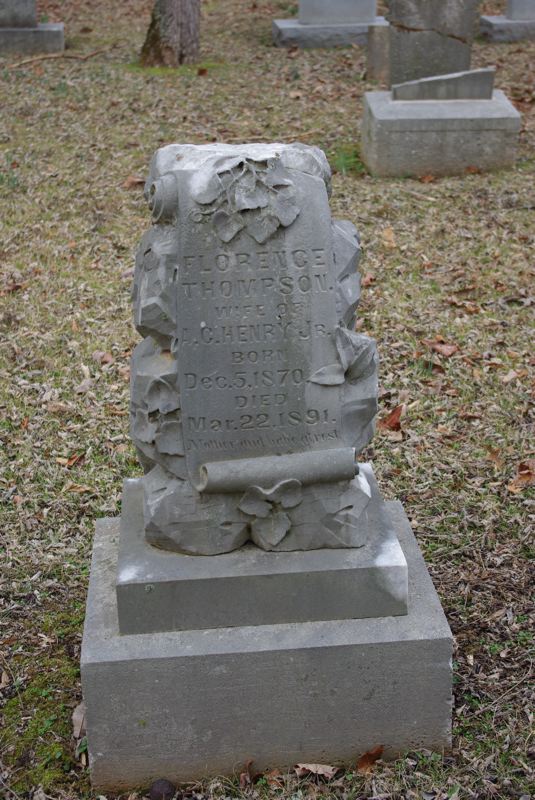
Florence Thompson
Wife Of
A.C. Henry, Jr.
Born
December 5, 1870
Died
March 22, 1891
Mother and daughter at rest
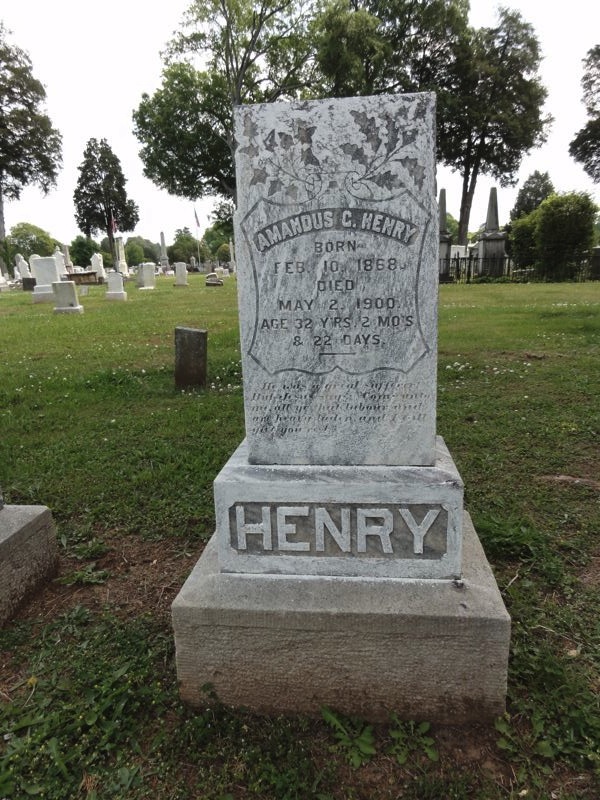
Amandus C. Henry
Born
February 10, 1858
Died
May 2, 1900
Age 32 yrs. 2 mos. & 22 dys.
He was a great sufferer!
But Jesus says: Come unto
me, all ye that labour and
are heavy laden, and I
will give you rest.
Henry
(Son of Dr. A.C. Henry, Sr.)
Buried in the Henry family plot in Athen, Alabama
Directions To The Grave of A.C. and Amanda Henry also A.C. Henry, Jr.
A.C. Henry is buried in the Athens City Cemetery, Athens, Limestone County, Alabama. On I-65 take Exit 351. Head west towards Athens. Take S. Clinton Street north. Go eight or ten blocks and turn right on Washington Street. Take the third left, Market Street. Stop the car just before the road takes a hard turn to the left. The A.C. Henry plot will be on your right, next to the street.
GPS Location
34°48'10.5"N 86°57'50.0"W
or D.d. 34.802907, -86.963900
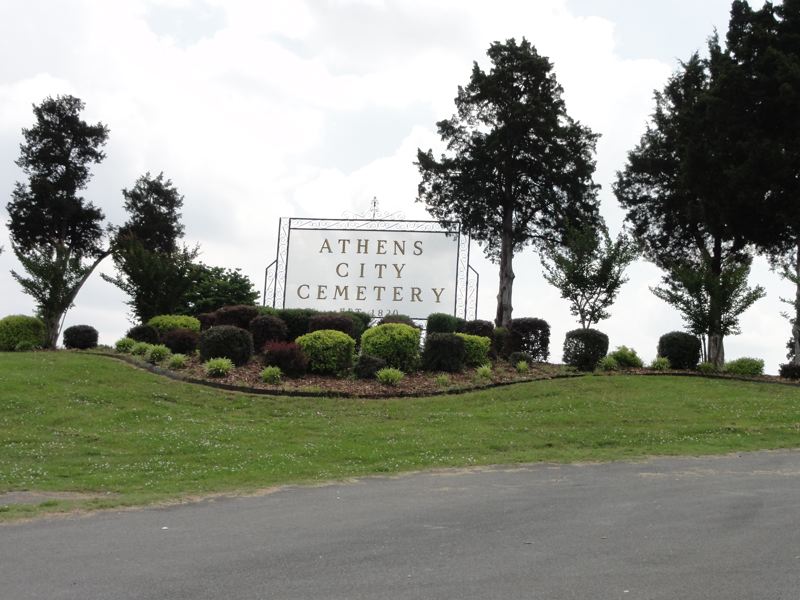
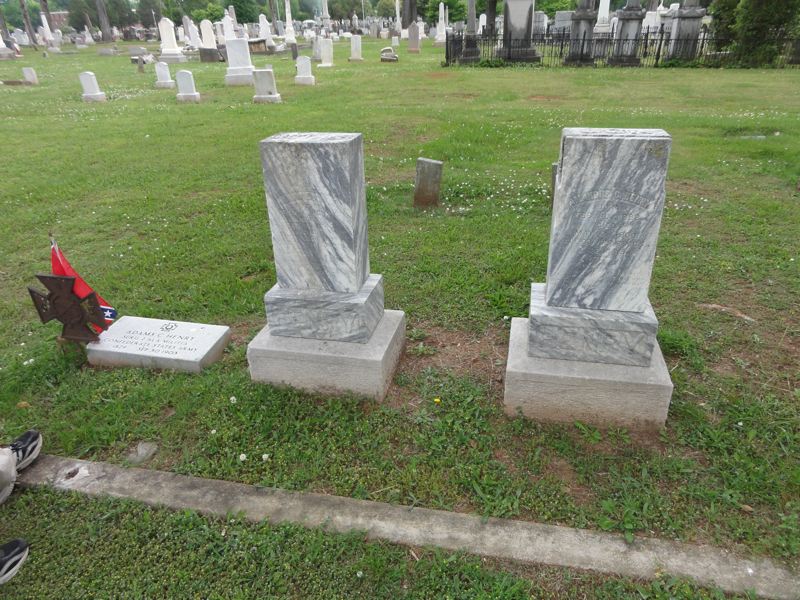
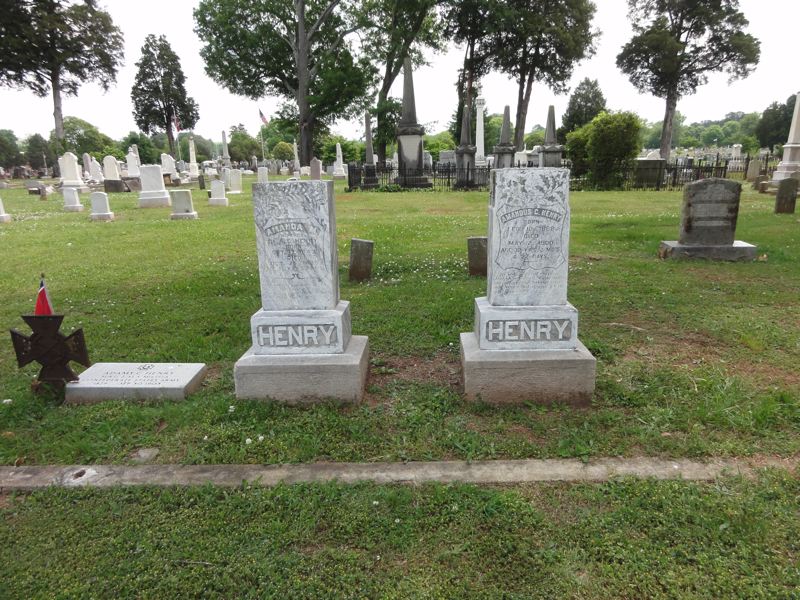
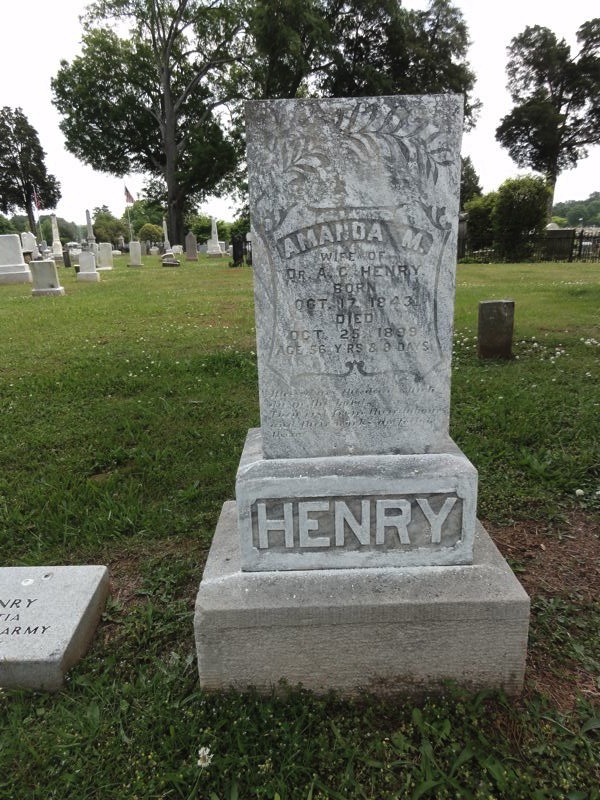
Amanda M.
Wife of
Dr. A.C. Henry
Born
October 17, 1843
Died
October 25, 1899
Age 56 yrs. & 8 dys.
Blessed are the dead which
Died in the Lord
They rest from their labours
And their works do follow them.
HENRY
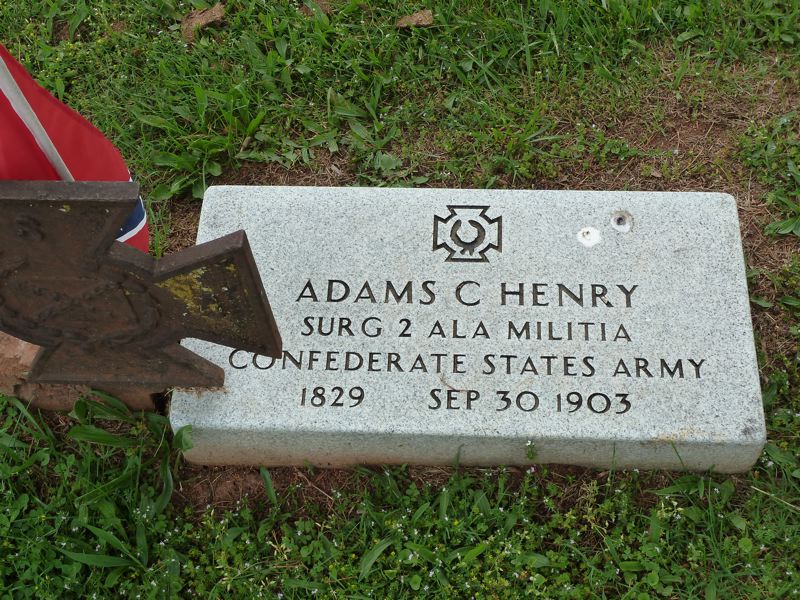
*Adams C Henry
Surg 2 ALA Militia
Confederate States Army
1829 September 30, 1903
![]()
*Dr. A.C. Henry's name appeared in numerous locations, periodicals, etc as is written here. "A.C." stands for "Ausbun Cicero." The gravestone placed in the HENRY burial plot is incorrect in a number of ways. First of all "Adams C. Henry" is incorrect. Again it is "Ausbun C. Henry." The next mistake on the stone is that the stone inscribes that he was born in 1829. He was actually born in September, 1936. We are still looking for the actual day of his birth. Then the last mistake is the date of his death. On the marker, the date is said to be "Sep 30 1903." According to an obituary that appeared on the 25th of September, 1903 in the Birmingham Ledger, A.C. Henry died the previous day, Friday, September 24, 1903. So, Three mistakes appear on the maker at A.C. Henry's grave.
Special Thanks
In May, 2010, Tom L. Childers, Scott Harp, and C. Wayne Kilpatrick some of the graves of church leaders of yesteryear, whose remains now rest in the Athens City Cemetery. Thanks to them for contributions of photos in information to make this page possible. Also, thanks to David A. Cox of Athens, Alabama for the work he has done in collecting newspaper obituaries and information on the lives of the Henrys. He contributed the information in February, 2011. He also gave to photos of Dr. and Amanda Henry. It originally came from a history of the Christian Church in Athens, Alabama.
![]()
